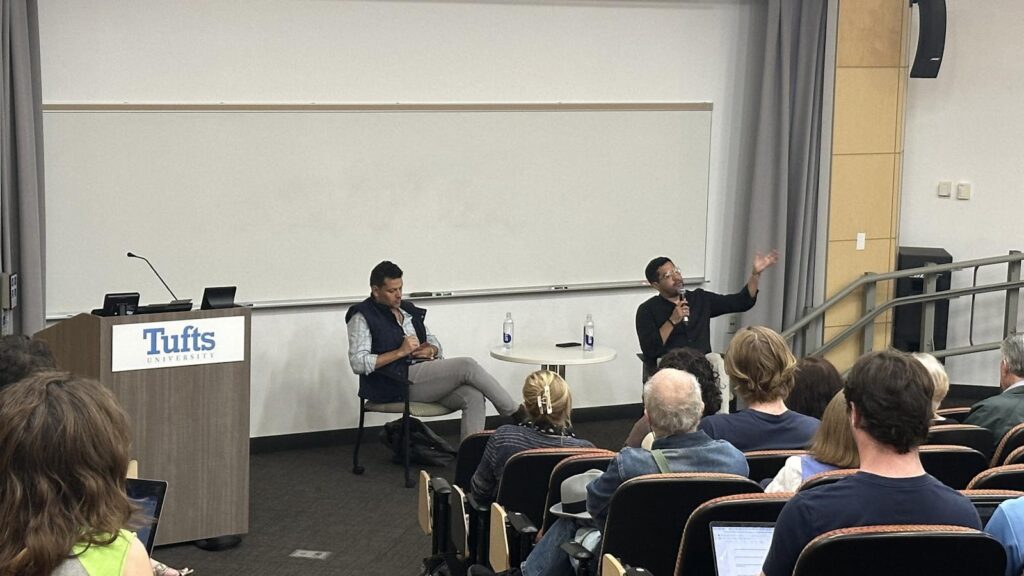The Department of Romance Studies hosted a discussion on Oct. 3 titled “The High Cost of Democracy, Freedom of the Press, and Immigration Policy,” focusing on the political climate in El Salvador and its parallels with politics in the United States. The event featured two speakers: Óscar Martínez, a Salvadoran journalist and co-founder of Latin America’s first digital newspaper, El Faro, and Iván Espinoza, executive director of Lawyers for Civil Rights in Boston.
Nancy Levy-Konesky, a senior lecturer in the romance studies department, spoke to the Daily about the inspiration for the event. She explained that she organized a similar talk in 2018 with Martínez to raise awareness about violence and corruption in El Salvador.
“People loved hearing about him, and it opened their eyes to a lot of violence. This was at a time when El Salvador was the most violent country in the world that was not at war,” Levy-Konesky said. “I decided it was important to have Óscar come back, because we’re in an election year, and because in El Salvador, the president was able to make himself a dictator in a very short amount of time.”
Martinéz opened the talk by providing an overview of El Salvador’s history, explaining how the peace agreement established after the end of the civil war in 1992 was ineffective, ushering in an era of violence, corruption and gang violence throughout the country.
“After the peace [agreement], we had a very violent peace,” Martinéz said. He discussed how corruption runs rampant throughout the government in El Salvador, affecting presidents on both the left and the right.
Martinéz then highlighted the current political conditions in El Salvador under President Nayib Bukele.
“Bukele named himself the coolest dictator in the world, … right now, he calls himself a ‘philosopher king,’” Martínez added.
Martinéz pointed to widespread corruption under Bukele, especially within the country’s criminal justice system. In El Salvador, where incarceration rates are currently triple those of the U.S., 1 in 57 Salvadorians are currently in jail.
“Any soldier, any police member, can arrest you just because you seem nervous. … There [are] a lot of people who [are] in jail just without proof,” he said.
Espinoza drew parallels between the issues confronting El Salvador and the current political climate in the U.S., comparing Bukele with former President Donald Trump. Both candidates revel in signifigant popularity despite engaging in actions that can be seen as anti-democratic, Espinoza argued, pointing to Trump’s false claims of election fraud that led his supporters to attack the U.S. Capitol on Jan. 6, 2022.
“I think there are lessons in the Salvadorian experience for how democratic institutions and democratic trust erodes over time that are very applicable to us in the [U.S.] today,” he said. “In the [U.S.], … we, in some quarters, are seeing an emphasis more on supporting a particular politician than supporting the institutions of democracy themselves.”
The conversation then shifted to the issue of immigration in the U.S. Martinez drew attention to Trump’s false claim during the presidential debate that Haitian migrants in Springfield, Ohio eat cats and dogs.
“I never saw migrants in the [U.S.] eating a dog,” he said. “But I saw [a] migrant eating garbage.”
Espinoza highlighted widespread xenophobia within the U.S., explaining how many Americans often harbor resentment toward immigrants for being supported by their tax dollars. However, according to Espinoza, Americans should reframe their perspective on immigrants and recognize the economic value that they bring.
“People don’t think about immigrants as an investment,” he said. “People don’t think about the economic vitality of immigrants to renew our economy and the investment we are placing on having these people enter our workforce.”
During the Q&A portion of the event, one audience member asked the speakers how they felt about Trump and Vice President Kamala Harris’ immigration policies.
“At this point, what we’re seeing is [for] both of the political parties … it’s really a race to the bottom on who could be more cruel to immigrants, who could be more difficult in the immigration process,” Espinoza said. “The entire conversation about asylum, humanitarian protection, how we continue to welcome people who are being persecuted, has evaporated as we just talk about being tough on immigrants.”
After the event, Elena Carrion Guerrero, a senior lecturer in the Department of Romance Studies, spoke with the Daily about how the talk provided valuable insights into how independent journalists such as Martínez play a critical role in holding politicians accountable. She pointed to the value of studying U.S. politics in comparison with the governments of other countries.
“Learning about other countries [and] their trajectories in politics, makes us think about our own. We take for granted many rights that we have,” Guerrero said.
Source link : http://www.bing.com/news/apiclick.aspx?ref=FexRss&aid=&tid=670a456f62fc441e88df9045cb19ed35&url=https%3A%2F%2Fwww.tuftsdaily.com%2Farticle%2F2024%2F10%2Fsalvadoran-journalist-and-boston-civil-rights-lawyer-discuss-democracy-2024-election-immigration-policy-during-lecture&c=8149163766844062319&mkt=en-us
Author :
Publish date : 2024-10-09 19:09:00
Copyright for syndicated content belongs to the linked Source.
